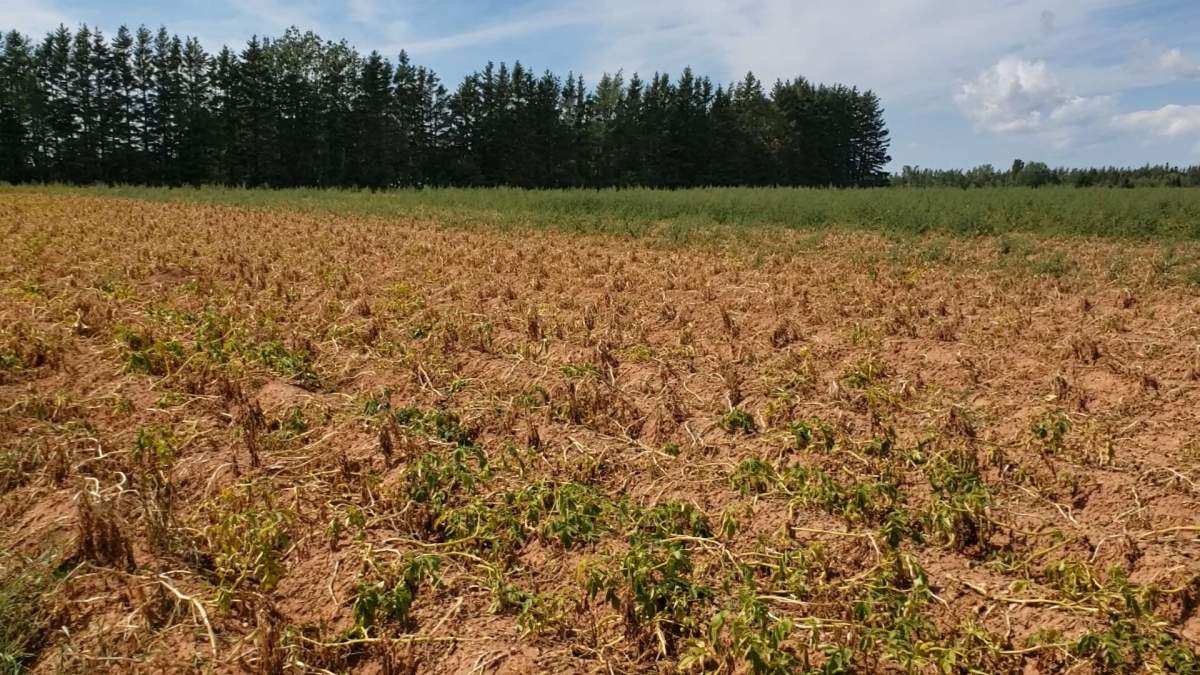It’s been a hot, dry summer on Prince Edward Island.

Good weather for beachgoers but devastating for the more than 180 potato farmers who for the most part across the province are dealing with severe drought conditions with record low rainfall amounts.
Farmers need rain but with little or none recently, farmers are pleading to the province to lift the 18-year ban on the use of agricultural irrigation systems to water their crops, which are in dire need of moisture.
P.E.I. potato farmers grow on average 2.5 billion pounds of potatoes per year and that total is in jeopardy as there has been almost no rain since the potato crop went in the ground, said Robert Godfrey, executive director with the P.E.I. Federation of Agriculture.
“It’s historically dry across the province,” said Godfrey.
To make matters worse, Godfrey says this is the fourth straight summer where dry conditions have hampered the growing season which is cutting into farmers’ yields and profits.
Western P.E.I. has been particularly dry, where the city of Summerside, for example, typically sees around 258 millimetres of rain from June through August. But so far this summer Environment Canada says only about 65 millimetres of rain has fallen.

“I would say this is probably the worst year that we’ve seen since 2001,” said Godfrey. “I had a farmer tell me the other day that he had to go back to 1963 or 1964 to when it was this dry across the province.”

Get daily National news
Following the 2001 drought, P.E.I. banned the drilling and use of high-capacity wells for irrigation on farms. Godfrey says that needs to change and he calls the irrigation ban discriminatory and harmful to farmers.
“You are able to get a high capacity well for water access and you can irrigate if you have a golf course for example,” said Godfrey. “And if you’re building a car wash, you can get a high capacity well, but if you want to irrigate crops and grow food you can’t.”
Greg Donald, general manager of the P.E.I. potato board, agrees with Godfrey and says the moratorium on agricultural irrigation needs to be suspended.
Donald says it’s become a political issue and that P.E.I. is the only province that has banned farmers from using high-capacity wells for irrigation.
“We’re getting hotter, higher temperatures, longer periods without rain,” said Donald. “And wind and irrigation is another tool that we need.”
In Nova Scotia, the dry, hot conditions are making for a tough summer for many farmers as well, but there is one crop that’s thriving.

These dry conditions are proving favourable for an emerging cash crop of wine grapes, especially for grape growers in the agricultural hot spot of the Annapolis Valley.
“Grapes need about half the water that a lot of other crops need and so we’re doing great, it’s looking like it could be a great finish this year,” said Steve Ells, owner of Ellslea vineyards.
Ells understands the volatility of growing any crop but even with the good, dry growing conditions, COVID-19 has created a labour shortage at vineyards across the region.
Come harvest time Ells says he will be short four temporary foreign workers.
“We have made it up with local workers and they are doing a great job but we are missing those experienced professional hands,” said Ells. “Most of the harvest is done by hand so it’s going to be a big challenge this year.”
The P.E.I. Federation of Agriculture says they met with Premier Dennis King last week and will meet again this week to examine irrigation opportunities but in the meantime, they’ll hold out hope for some rain.
“Unfortunately the damage has been done this year, we’re not going to be able to do anything that’s going to help this year,” said Donald. “But I think for the confidence of our farmers and for those who chose to use supplemental irrigation, there needs to be some direction from government on that.”




Comments